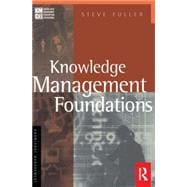
Note: Supplemental materials are not guaranteed with Rental or Used book purchases.
Purchase Benefits
What is included with this book?
| Introduction | p. ix |
| What Knowledge Management Has Managed to Do to Knowledge | p. 1 |
| Much Ado about Knowledge: Why Now? | p. 2 |
| Historical Myopia as a Precondition for Knowledge Management | p. 5 |
| What's in a Name?: "Knowledge Management," | p. 12 |
| Knowledge and Information: The Great Bait and Switch | p. 16 |
| The Scientist: KM's Enemy Number One? | p. 20 |
| The KM Challenge to Knowledge in Theory and Practice | p. 23 |
| KM and the End of Knowledge in Theory: The Deconstruction of Public Goods | p. 23 |
| KM and the End of Knowledge in Practice: The Disintegration of the University | p. 30 |
| Back to Basics: Rediscovering the Value of Knowledge in Rent, Wage, Profit | p. 36 |
| The Epistemic Empire Strikes Back: Metapublic Goods and the Injection of Academic Values into Corporate Enterprise | p. 44 |
| Squaring the KM Circle: Who's Afraid of Accelerating the Production of New Knowledge? | p. 49 |
| Making Knowledge Matter: Philosophy, Economics, and Law | p. 57 |
| The Basic Philosophical Obstacle to Knowledge Management | p. 58 |
| The Philosophical Problem of Knowledge and Its Problems | p. 61 |
| The Creation of Knowledge Markets: The Idea of an Epistemic Exchange Rate | p. 67 |
| An Offer No Scientist Can Refuse: Why Scientists Share | p. 72 |
| Materializing the Marketplace of Ideas: Is Possessing Knowledge Like Possessing Money? | p. 75 |
| Intellectual Property as the Nexus of Epistemic Validity and Economic Value | p. 81 |
| The Challenges Posed by Dividing the Indivisible | p. 82 |
| The Challenges Posed by Inventing the Discovered | p. 88 |
| Interlude: Is the Knowledge Market Saturated or Depressed?: Do We Know Too Much or Too Little? | p. 93 |
| Recapitulation: From Disciplines and Professions to Intellectual Property Law | p. 96 |
| The Legal Epistemology of Intellectual Property | p. 98 |
| Two Strategies for Studying the Proprietary Grounds of Knowledge | p. 105 |
| Epilogue: Alienating Knowledge from the Knower and the Commodification of Expertise | p. 106 |
| Information Technology as the Key to the Knowledge Revolution | p. 116 |
| Introduction: From Epistemology to Information Technology | p. 117 |
| The Post-Industrial Dream: The Intellectualization of Information Technology | p. 125 |
| Society's Shifting Human-Computer Interface: An Historical Overview | p. 137 |
| From Expertise to Expert Systems | p. 143 |
| A Brief Social History of Expertise | p. 143 |
| How Knowledge Engineers Benefit from the Social Character of Expertise | p. 145 |
| The Lessons of Expert Systems for the Sociology of Knowledge Systems | p. 151 |
| Expert Systems and the Pseudo-Democratization of Expertise | p. 154 |
| Recapitulation: Expertise as the Ultimate Subject of Intellectual Property | p. 161 |
| Why Even Scholars Don't Get a Free Lunch in Cyberspace | p. 167 |
| A Tale of Two Technophilosophies: Cyberplatonism versus Cybermaterialism | p. 169 |
| The Publishing Industry as the Cyberscapegoat | p. 174 |
| Adding Some Resistance to the Frictionless Medium of Thought | p. 178 |
| Why Paperlessness Is No Panacea | p. 183 |
| Does Cyberspace "Deserve" Peer Review? | p. 187 |
| Conclusion: Purifying Cyberplatonism's Motives | p. 189 |
| Postscript: Capitalized Education as the Ultimate Information Technology | p. 191 |
| A Civic Republican Theory of Knowledge Management | p. 196 |
| The Historical and Philosophical Bases of Civic Republicanism | p. 197 |
| A Distinguished False Lead: Michael Polanyi's "Republic of Science" | p. 203 |
| In Search of Republican Vehicles for Knowledge Management | p. 211 |
| Knowledge Worker Unions | p. 212 |
| Consensus Conferences | p. 213 |
| Universities: The Ultimate Republican Institution | p. 216 |
| Historic Threats to the Republican Constitution of the University | p. 220 |
| The Challenge of Contract Academic Workers to the University's Republican Constitution | p. 225 |
| Conclusion: A Civic Republican Agenda for the Academic CEO of Tomorrow | p. 229 |
| What's Living and Dead in Peer-Review Processes? | p. 232 |
| Introduction: The Scope of Peer Review | p. 232 |
| Defining Peers | p. 235 |
| Recruiting Peers | p. 238 |
| Systematically Recording Peer Judgments | p. 241 |
| Ethically Monitoring Peer Judgments | p. 242 |
| "Extended Peer Review": The Universal Solvent? | p. 245 |
| Does Peer Review Have a Future? Implications for Research and Policy | p. 248 |
| Methodological Note | p. 251 |
| Conclusion: The Mixed Root Metaphor of Knowledge Management | p. 252 |
| References | p. 254 |
| Index | p. 270 |
| Table of Contents provided by Syndetics. All Rights Reserved. |
The New copy of this book will include any supplemental materials advertised. Please check the title of the book to determine if it should include any access cards, study guides, lab manuals, CDs, etc.
The Used, Rental and eBook copies of this book are not guaranteed to include any supplemental materials. Typically, only the book itself is included. This is true even if the title states it includes any access cards, study guides, lab manuals, CDs, etc.